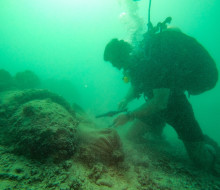
Second World War-era bombs in Vanuatu made safe by Navy divers
26 June 2024
Unfortunately you are viewing this website on an outdated browser which does not support the necessary features for us to provide an adequate experience. Please switch to a modern browser such as latest version of Google Chrome, Mozilla Firefox, Apple Safari or Microsoft Edge.
Ngā mihi nui
Brought up in the rural deep south, Sub Lieutenant Tayla Richards always wanted an active job that could offer plenty of variety.
Having returned from a six-month exchange in a British Royal Navy (RN) ship patrolling the Falkland Islands, it’s safe to say the Royal New Zealand Navy (RNZN) marine engineer has found that balance.
“I was very fortunate to experience it, and to work with a lot of cool people,” she said.
“We were at sea quite a lot, but we got to spend time ashore in the Falkland Islands. There are about 3,000 people living there, along with thousands of penguins and amazing wildlife.”
Small-town life such as that in the Falklands is familiar territory for Sub Lieutenant Richards who grew up in the Southland town of Edendale, with a population of just under 600.
She joined the RNZN in 2021 after finishing a mechanical engineering degree.
“I had gone to Southland Girls’, then university and got into my first ever desk job doing design engineering,” Sub Lieutenant Richards said.
“As someone who had grown up on a farm, sitting behind a desk was not something I enjoyed. A Defence Force recruiter said the Navy has an active lifestyle. I thought, that sounds like a good deal to me.”
She completed her Junior Officer Common Training in Auckland, then worked in Managed Isolation and Quarantine facilities during the Covid-19 pandemic for four months.
HMS Sultan’s Commanding Officer, Captain Mark Hamilton, congratulates marine engineer officer Sub Lieutenant Richards on completing her exchange course with the UK’s Royal Navy. Photo by Petty Officer Photographer Pepe Hogan / Royal Navy
After working in ship maintenance at Devonport Naval Base, she posted to the Defence School of Marine Engineering at HMS Sultan in the United Kingdom to do her Systems Engineering and Management Course (Marine Engineering).
RNZN marine engineering officers undertake overseas training in Australia or the United Kingdom; the latter usually involves an exchange aboard an RN vessel as an Assistant Marine Engineering Officer.
Sub Lieutenant Richards was posted to River Class Offshore Patrol Vessel HMS Medway, based in the South Atlantic Ocean.
The sea posting allows trainees to immerse themselves in the dynamic environment of naval operations and learn to liaise with other departments on board, as well as experience how other navies operate.
“Medway was quite similar to our ships, but they stay out there and do crew rotations - they change out 50 per cent of the crew every three months. It’s good, they get to come back refreshed.”
Now that she’s fully qualified and back in New Zealand, Sub Lieutenant Richards is ready for a ship posting as a Deputy Marine Engineering Officer when a space becomes available.
“The overseas courses are very manageable. When you’ve already got an engineering mindset, you know what you need to be learning and they make sure you get the training. The time on ship consolidates it really well."